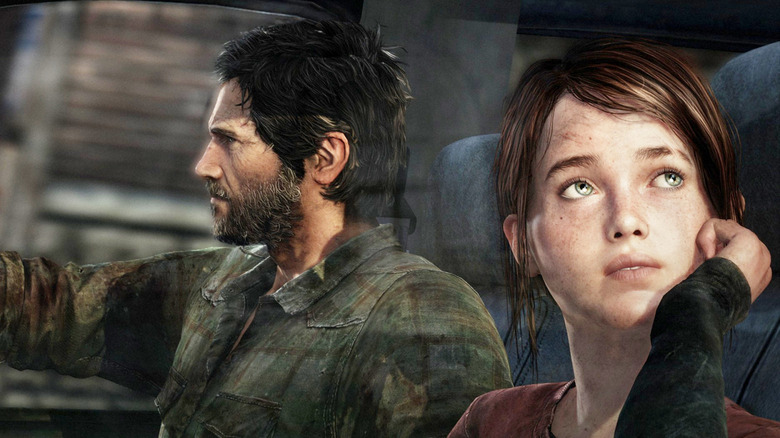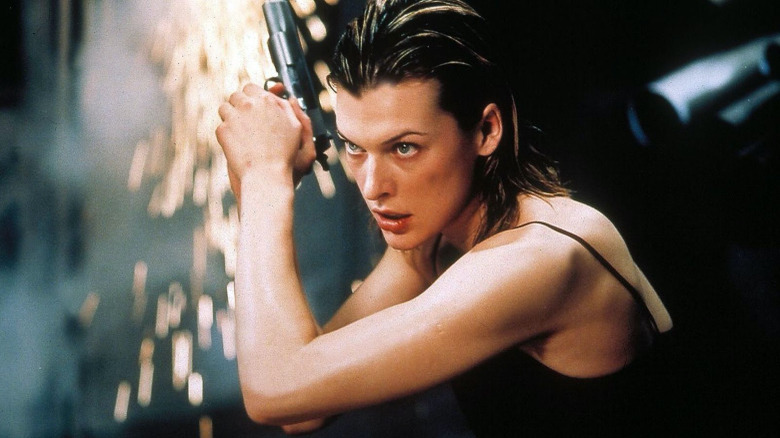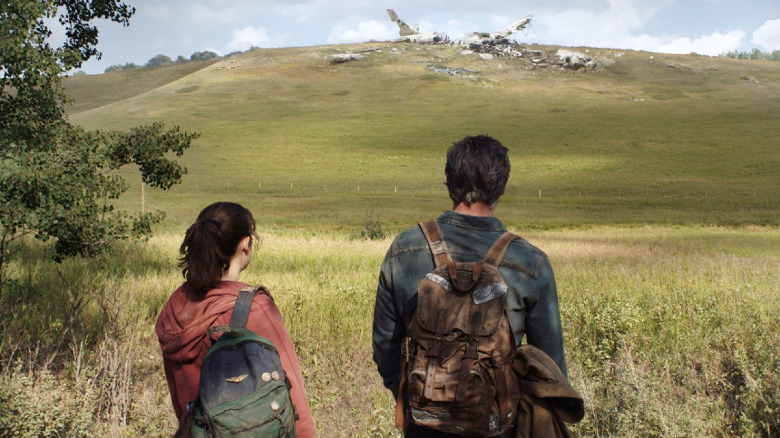Why Sam Raimi's The Last Of Us Movie Never Got Off The Ground
The history of video game cinema is littered with fascinating what-ifs when it comes to the movies that were never made. George A. Romero's "Resident Evil" and Gore Verbinski's "Bioshock" are the stuff of legend, while David O. Russell's vision for "Uncharted" — which was put into development back when Russell's name wasn't mud — was certainly a far cry from the final version of the film. If nothing else, it would have featured a whole lot less parkour.
Not as well-remembered but perhaps just as notable is Sam Raimi's "The Last of Us," a film that would've seen the "Evil Dead" and "Spider-Man" helmer try his hand at bringing directors Bruce Straley and Neil Druckmann's touchstone post-apocalyptic survival horror video game to life on the big screen. Screen Gems and Raimi's Ghost House Pictures boarded the movie in March 2014, less than a year after the original game took the world by storm in the summer of 2013. Druckmann was attached to write the script at the time, which also makes him a reliable first-hand source for finding out what, precisely, went wrong.
A 'sexier' take on the post-apocalyse
Paul W. S. Anderson's 2002 "Resident Evil" film didn't, per se, crack the video game movie code (pun partly intended). The writer and director's own "Mortal Kombat" was an enjoyably silly rendition of the bloody martial arts fantasy property that grossed more than six times its $20 million budget at the box office in 1995. What's more, Simon West's "Lara Croft: Tomb Raider" had only just hit it big in theaters in 2001, bringing in $273 million on its way to becoming a ridiculous yet vital landmark in the evolution of women-led action movies.
Unlike those films, however, Screen Gems had been directly involved in making "Resident Evil." That also meant the studio felt it had stumbled upon a winning formula for video game movies after the success of Anderson's initial zombie action-thriller led to five direct sequels. Sure enough, as Neil Druckmann explained in an interview with The New Yorker, Screen Gems saw "The Last of Us" being "a particular kind of movie," as he (quite politely) put it. As such, they pushed him to make the film larger-scale and "sexier" than the game, much like "Resident Evil" had done with its own source material.
To their credit, Anderson and "Resident Evil" star Milla Jovovich were increasingly able to impose their own personal creative vision onto those films as they went along — as Matt Draper breaks down in this excellent video — even as they moved further and further away from the games that inspired them. With "The Last of Us," however, Druckmann was keen on staying faithful to the harsh, brutal, neo-Western tone and visuals of the original game (which, as The New Yorker pointed out, hews closer to "No Country for Old Men" than what Screen Gems had in mind).
The lessons of Uncharted
Neil Druckmann's unease with Screen Gems' plans for adapting "The Last of Us" also stemmed from his experience with "Uncharted." When the film rights to the latter video game were optioned by Sony in 2008, Druckmann and Naughty Dog wound up losing much of their creative control over the movie. "Uncharted" would then spend the next 12 years stuck in pre-production limbo, with a never-ending stream of directors and writers joining and then leaving the project before it finally began shooting in 2020. "At some point, I think we just said, 'You guys run with it because we can't keep investing time in this,'" Druckmann told The New Yorker.
While Druckmann was diplomatic and called the "Uncharted" movie "fun" (critics, on the other hand, were a tad less charitable) he also made it clear in the interview that he was never invested in the film the way he was when it came to adapting "The Last of Us" for the screen. "I helped create 'Uncharted,' but it didn't come from me the way that 'The Last of Us' did," he said. "If a bad version of 'The Last of Us' comes out, it will crush me." Finally, after years of being unable to see eye-to-eye with Druckmann on the matter, Screen Gem lost the film rights to "The Last of Us" and Druckmann teamed up with "Chernobyl" creator Craig Mazin to adapt the game into an HBO series instead.
Reining in Raimi
When he spoke to The New Yorker, Neil Druckmann indicated he had always had faith in Sam Raimi; it was studio executives who led to the downfall of Raimi and Screen Gem's "The Last of Us." Indeed, anyone who's caught his under-seen crime drama-thriller "A Simple Plan" knows Raimi would've had no trouble doing right by the original video game's austere aesthetics and smaller human drama. The idea of the "Evil Dead" maestro getting to put his own gross spin on the game's fungal monsters is equally promising. In that regard, the film might've allowed Raimi to merge his horror filmmaking with his more subdued storytelling instincts in a way that arguably no other project has to date.
Therein, of course, lies the issue. Raimi's direction and creative tendencies have felt reined in when he's worked with bigger budgets outside of the "Spider-Man" films, as evidenced by his attempts to inject some life into the glossy, hollow tentpoles "Oz the Great and Powerful" and "Doctor Strange in the Multiverse of Madness." Since it's clear from Druckmann's interview that Screen Gems wasn't interested in letting Raimi off the leash with "The Last of Us," it's probably for the better his movie didn't happen. At least with his and Craig Mazin's HBO show, Druckmann and all other concerned parties are being allowed to thrive or fail on their own terms.
"The Last of Us" will premiere on HBO on January 15, 2023.



